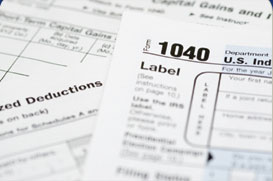
(760) 765-0343

Click links to access Tax Resources
• February 2012 Tax Alerts• January 2012 Tax Alerts
• December 2011 Tax Alerts
• July 2011 Tax Alerts
• January 2011 Tax Alerts
• 2010 Tax Alerts
Click links to access Tax Resources
• IRS• Franchise Tax Board
• Other Forms
Click links to access Tax Forms
• February 2012Click links to access Tax Resources / Tools
• 2011 Tax Planner• Tax Resources
• 2012 Taxes Quickguide
Click links to access Tax Resources
February 2012 Tax Alerts
2012 Tax Deadlines
February 28 -
Payers must file 2011 information returns (such as 1099s) with the IRS.
(Electronic filers have until April 2 to file.)
(Electronic filers have until April 2 to file.)
February 29 -
Employers must send 2011 W-2 copies to the Social Security Administration.
(Electronic filers have until April 2 to file.)
(Electronic filers have until April 2 to file.)
March 1 -
Farmers and fishermen who did not make 2011 estimated tax payments must file 2011 tax returns and pay taxes in full.
March 15 -
2011 calendar-year corporation income tax returns are due.
Taxpayers Required to Report Income in Foreign Bank Accounts
U.S. taxpayers are required to report their worldwide income, that is, income from both US and foreign sources. In addition, taxpayers who have an interest in, or signature or other authority over, a financial account in a foreign country � such as a bank account, securities account, or other financial account � are required to file Form TD F 90-22.1, Report of Foreign Bank and Financial Accounts (FBAR), if the aggregate value of all such financial accounts exceeds $10,000 at any time during the calendar year. The FBAR is not filed with your tax return. Instead, it is filed with the Department of the Treasury in Detroit, Michigan, no later than June 30 of the year following the calendar year reported.Failure to report income in foreign bank accounts, or to file the FBAR, carries serious consequences, including large monetary penalties and, in some cases, criminal penalties.
If you have foreign bank accounts and are unsure whether you are required to file the FBAR, we would be happy to review your portfolio and advise you.
Use Adjusted Tax Numbers for 2012 Tax Planning
Each year the IRS adjusts certain tax numbers for inflation and tax law changes. Here are some of the adjusted numbers you�ll need for your 2012 tax planning.
• Standard mileage rate for business driving remains at 55.5� a mile. Rate for medical and
moving mileage decreases to 23� a mile. Rate for charitable driving remains at 14� a
mile.
• Section 179 maximum first-year expensing deduction decreases to $139,000, with a
phase-out threshold of $560,000.
• Transportation fringe benefit limit decreases to $125 for vehicle/transit passes and
increases to $240 for qualified parking.
• Social security taxable wage limit increases to $110,100. Retirees under full retirement
age can earn up to $14,640 without losing benefits.
• Kiddie tax threshold remains at $1,900 and applies up to age 19 (up to age 24 for full-
time students).
• Nanny tax threshold increases to $1,800.
• Health savings account (HSA) contribution limit increases to $3,100 for individuals and to
$6,250 for families. An additional $1,000 may be contributed by those 55 or older.
• 401(k) maximum salary deferral increases to $17,000 ($22,500 for 50 and older).
• SIMPLE maximum salary deferral remains at $11,500 ($14,000 for 50 and older).
• IRA contribution limit remains at $5,000 ($6,000 for 50 and older).
• Estate tax top rate remains at 35%, and the exemption amount increases to $5,120,000.
• The annual gift tax exclusion remains at $13,000.
• Adoption tax credit decreases to $12,650 for adoption of an eligible child.
Julian Office: 4367 Highway 78, Ste. 112, Santa Ysabel, CA 92070 (760) 765-0343 (760) 765-0150 Fax
San Diego Office: (By Appointment Only) 3751 37th St., #2, San Diego, CA 92105 (619) 283-7113 (619) 284-7113 Fax
Correspondence: P.O. Box 1934, Julian, CA 92036 E-mail: rebecca(at)luerscpa.com jan(at)luerscpa.com
San Diego Office: (By Appointment Only) 3751 37th St., #2, San Diego, CA 92105 (619) 283-7113 (619) 284-7113 Fax
Correspondence: P.O. Box 1934, Julian, CA 92036 E-mail: rebecca(at)luerscpa.com jan(at)luerscpa.com


© 2010 Luers & Dyer, CPA, LLP. All Rights Reserved.


Website Design: été advertising & design